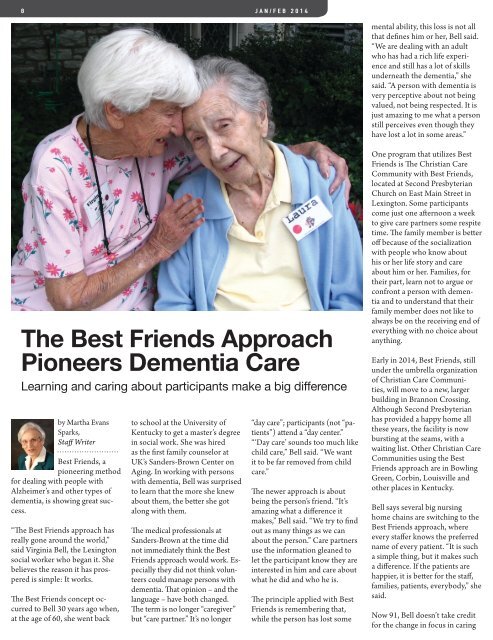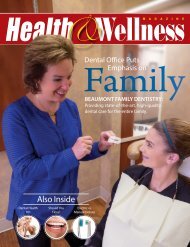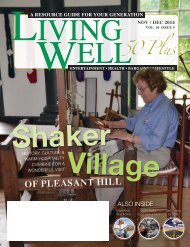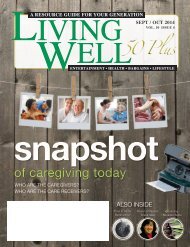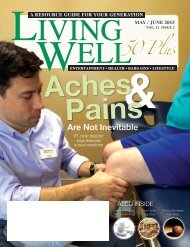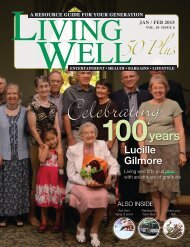Living Well 60+ January-February 2014
You also want an ePaper? Increase the reach of your titles
YUMPU automatically turns print PDFs into web optimized ePapers that Google loves.
8 JAN/FEB 2 0 1 4<br />
mental ability, this loss is not all<br />
that defines him or her, Bell said.<br />
“We are dealing with an adult<br />
who has had a rich life experience<br />
and still has a lot of skills<br />
underneath the dementia,” she<br />
said. “A person with dementia is<br />
very perceptive about not being<br />
valued, not being respected. It is<br />
just amazing to me what a person<br />
still perceives even though they<br />
have lost a lot in some areas.”<br />
The Best Friends Approach<br />
Pioneers Dementia Care<br />
Learning and caring about participants make a big difference<br />
by Martha Evans<br />
Sparks,<br />
Staff Writer<br />
Best Friends, a<br />
pioneering method<br />
for dealing with people with<br />
Alzheimer’s and other types of<br />
dementia, is showing great success.<br />
“The Best Friends approach has<br />
really gone around the world,”<br />
said Virginia Bell, the Lexington<br />
social worker who began it. She<br />
believes the reason it has prospered<br />
is simple: It works.<br />
The Best Friends concept occurred<br />
to Bell 30 years ago when,<br />
at the age of 60, she went back<br />
to school at the University of<br />
Kentucky to get a master’s degree<br />
in social work. She was hired<br />
as the first family counselor at<br />
UK’s Sanders-Brown Center on<br />
Aging. In working with persons<br />
with dementia, Bell was surprised<br />
to learn that the more she knew<br />
about them, the better she got<br />
along with them.<br />
The medical professionals at<br />
Sanders-Brown at the time did<br />
not immediately think the Best<br />
Friends approach would work. Especially<br />
they did not think volunteers<br />
could manage persons with<br />
dementia. That opinion – and the<br />
language – have both changed.<br />
The term is no longer “caregiver”<br />
but “care partner.” It’s no longer<br />
“day care”; participants (not “patients”)<br />
attend a “day center.”<br />
“‘Day care’ sounds too much like<br />
child care,” Bell said. “We want<br />
it to be far removed from child<br />
care.”<br />
The newer approach is about<br />
being the person’s friend. “It’s<br />
amazing what a difference it<br />
makes,” Bell said. “We try to find<br />
out as many things as we can<br />
about the person.” Care partners<br />
use the information gleaned to<br />
let the participant know they are<br />
interested in him and care about<br />
what he did and who he is.<br />
The principle applied with Best<br />
Friends is remembering that,<br />
while the person has lost some<br />
One program that utilizes Best<br />
Friends is The Christian Care<br />
Community with Best Friends,<br />
located at Second Presbyterian<br />
Church on East Main Street in<br />
Lexington. Some participants<br />
come just one afternoon a week<br />
to give care partners some respite<br />
time. The family member is better<br />
off because of the socialization<br />
with people who know about<br />
his or her life story and care<br />
about him or her. Families, for<br />
their part, learn not to argue or<br />
confront a person with dementia<br />
and to understand that their<br />
family member does not like to<br />
always be on the receiving end of<br />
everything with no choice about<br />
anything.<br />
Early in <strong>2014</strong>, Best Friends, still<br />
under the umbrella organization<br />
of Christian Care Communities,<br />
will move to a new, larger<br />
building in Brannon Crossing.<br />
Although Second Presbyterian<br />
has provided a happy home all<br />
these years, the facility is now<br />
bursting at the seams, with a<br />
waiting list. Other Christian Care<br />
Communities using the Best<br />
Friends approach are in Bowling<br />
Green, Corbin, Louisville and<br />
other places in Kentucky.<br />
Bell says several big nursing<br />
home chains are switching to the<br />
Best Friends approach, where<br />
every staffer knows the preferred<br />
name of every patient. “It is such<br />
a simple thing, but it makes such<br />
a difference. If the patients are<br />
happier, it is better for the staff,<br />
families, patients, everybody,” she<br />
said.<br />
Now 91, Bell doesn’t take credit<br />
for the change in focus in caring


